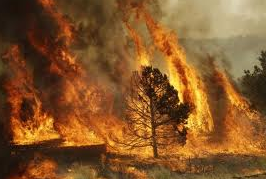Scientists Warn Of 'Increasing Fire Activity Across Large Areas Of The Planet'
 Climate change will make U.S. western wildfires, like those now raging in parts of Colorado and New Mexico, more frequent over the next 30 years, researchers reported on Tuesday. [Reuters, U.C. Berkeley news release]
Climate change will make U.S. western wildfires, like those now raging in parts of Colorado and New Mexico, more frequent over the next 30 years, researchers reported on Tuesday. [Reuters, U.C. Berkeley news release] Climate change is widely expected to disrupt future fire patterns around the world, with some regions, such as the western United States, seeing more frequent fires within the next 30 years, according to a new analysis led by researchers at the University of California, Berkeley, in collaboration with an international team of scientists.
By the end of the century, almost all of North America and most of Europe is projected to see a jump in the frequency of wildfires, primarily because of increasing temperature trends. At the same time, fire activity could actually decrease around equatorial regions, particularly among the tropical rainforests, because of increased rainfall.
The study, published today (Tuesday, June 12) in Ecosphere, an open-access, peer-reviewed journal of the Ecological Society of America, used 16 different climate change models to generate what the researchers said is one of the most comprehensive projections to date of how climate change might affect global fire patterns.
“In the long run, we found what most fear — increasing fire activity across large parts of the planet,” said study lead author Max Moritz, fire specialist in UC Cooperative Extension. “But the speed and extent to which some of these changes may happen is surprising.”
Bank of America Corp , which has faced criticism for dealings with coal companies in recent years, on Monday set a new 10-year, $50 billion goal to provide loans and other financing for environmentally friendly energy projects. [Reuters]
A fast-growing wildfire raged through dry forests and hillside subdivisions in northern Colorado on Monday, charring homes and forcing hundreds of families to evacuate in the latest out-of-control blaze to scorch the parched West. [New York Times]
The U.S. still lagged behind other nations in 2011 in the share of energy it gets from renewable sources, in spite of a more than 300% increase in funding for green power projects over the last decade. [Los Angeles Times]
Mitt Romney’s criticism of President Barack Obama for promoting green-energy subsidies may keep the former Massachusetts governor from boasting about his own contribution to his state’s expanding clean-energy industry. [Businessweek]
A report from a new institute at the State University at Buffalo asserting that state oversight has made natural gas drilling safer is causing tumult on campus and beyond, with critics arguing that the institute is biased toward industry and could undercut the university’s reputation. [New York Times]
Huge amounts of carbon trapped in the soils of U.S. forests will be released into the air as the planet heats up, contributing to a “vicious cycle” that could accelerate climate change, a new study concluded. [Washington Post]
You can return to the main Market News page, or press the Back button on your browser.

